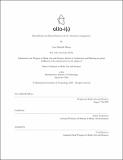allo-i(s) : mixed reality and mixed method tools for alternative imaginations
Author(s)
Mboya, Arwa Michelle.
Download1227786925-MIT.pdf (8.919Mb)
Alternative title
Mixed reality and mixed method tools for alternative imaginations
Other Contributors
Program in Media Arts and Sciences (Massachusetts Institute of Technology)
Advisor
Ethan Zuckerman.
Terms of use
Metadata
Show full item recordAbstract
The Imagination is a central - and underexplored - part of our cognitive faculties. It allows us to dream, hypothesize and solve problems. Imagination is often linked with 'outside the box' thinking and the ability to conceive of novel or unexpected solutions to problems . For women in urban slums in Kenya, stringent social norms that narrow socio-economic possibilities can pose a serious obstacle to imaginative thinking about their futures and self efficacy. Can immersive storytelling be used as a tool to dismantle those strictly defined boxes and result in more imaginative thinking about possible futures for women? Virtual Reality has often been called an 'empathy machine' but can it be an 'Imagination' machine as well? This study uses a mixed methods approach to develop a conceptual framework around thinking about the Imagination. In particular, I define what an Imagination Machine is and using the results of this study, develop a framework of the key emerging elements of an Imagination Machine that can be useful to any experience designer. The first analysis is adapted from the Growth Mindset Instrument (Dweck, 2006) and the second innovates on natural language processing techniques, using deviations in Word2Vec embeddings to analyze imaginative language. I also leave space for further analyses based on the data and experiment experience. I designed a study where women engage in a series of Imagination exercises and surveys that test imaginative thinking between members of one of four treatment groups: 1) A Narrative VR experience 2) A non-narrative VR experience 3) A text form short story and 4) A control. Using the results, I develop a conceptual framework for understanding what an Imagination Machine is. The key emerging elements are: Story, Immersion, Transposition, Alternate Reality Building and Access. This thesis is at once a rigorous and novel study and an imaginative exploration itself of what Virtual Reality Human Interaction means, when "Human" deliberately includes black women .
Description
Thesis: S.M., Massachusetts Institute of Technology, School of Architecture and Planning, Program in Media Arts and Sciences, September, 2020 Cataloged from student-submitted PDF version of thesis. Includes bibliographical references (pages 141-149).
Date issued
2020Department
Program in Media Arts and Sciences (Massachusetts Institute of Technology)Publisher
Massachusetts Institute of Technology
Keywords
Program in Media Arts and Sciences